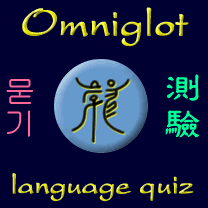
Here’s a recording in a mystery language.
Do you know or can you guess the language?
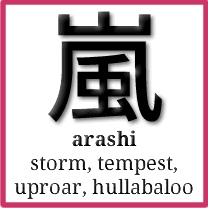
An interesting Japanese word I learnt recently is 嵐 (arashi), which means storm, tempest, uproar or hullabaloo [source].
It is made up of the kanji 山 (yama), which means mountain, hill, and various other things, and 風 (kaze), which means wind, breeze, manner, and various other things. So if when I first saw the kanji 嵐, I guessed that it was referred to some kind of wind from the mountains, or a wind that lives among the mountains.
嵐 appears in the following phrases:
Other stormy words in Japanese include:
暴風 and 暴風雨 can also be pronounced arashi [source].
The character 岚 [嵐] also exists in Chinese and is pronounced lán in Mandarin. It means mountain mist or haze, and is used mainly in place names, such as 岚山区 (Lanshan District), a part of Rizhao City (日照市) in Shandong Province in the northeast of China, and 岚皋县 (Langao County) in Shaanxi Province in central China.
There is also a district of Kyoto in Japan called 嵐山 (Arashiyama), and a nearby mountain with the same name. That area is famous for its bamboo forests.
A good spot for a bit of 森林浴 (senrinyoku), that is forest bathing / therapy, or in other words, a peaceful walk through the woods for health benefits. This word was apparently coined in 1982 by Tomohide Akiyama (秋山智英), the head of the Japanese Ministry of Agriculture, Forestry and Fisheries, to encourage more visitors to forests. Although it was a new word, the idea that spending time among trees in a forest is good for your health has been around for a long time in Japan [source]
While writing this, I realised that Omniglot doesn’t have a page about weather-related words in Japanese yet – I will put one together soon. If you know any interesting weather-related words and/or idioms in Japanese, do let me know.
Recently I came across the French word antisèche [ɑ̃.ti.sɛʃ]. At first glance I would guess that it meant something like “anti-dry”, so maybe it’s a moisturiser or something similar that prevents dryness.
While that would be an accurate literal translation – it comes from anti- and sécher (to dry) – what it actually means is a cheat sheet or crib sheet. That is, a sheet of paper used to assist on a test [source].
As well as meaning to dry, sécher also means to skip or miss (class), to dry out, to wither, to dry up or to be stumped. So an antisèche is something that prevents you from being stumped or drying up when asked difficult questions [source].
I have a number of antisèches, or maybe they’re more feuilles de référence, that summerise grammatical information for Irish and Russian. They’re very handy when I’m trying to write anything in these languages. You can find a variety of these for languages and other subjects on Amazon.
Are there interesting names for such things in other languages?
Some early alphabets, such as Ancient Greek, Latin and Etruscan were written in a style known as boustrophedon [ˌbuːstrəˈfiːdən], which involves alternate lines of a text being reversed, with letters also written in reverse. Here’s an example in Old / Archaic Latin:

The first and third lines of this text are written from right to left, while the second and fourth lines are written from left to right.
Transliteration
Opnēs hemones decnotāti et iouesi louberoi et parēs gnāscontor, rationes et comscientiās particapes sont, quibos enter sēd comcordiās studēōd agontinom est.
Translation
All human beings are born free and equal in dignity and rights. They are endowed with reason and conscience and should act towards one another in a spirit of brotherhood.
(Article 1 of the Universal Declaration of Human Rights)
Translation (boustrophedon style)

The word boustrophedon could be translated literally as “like the ox turns [while plowing]”. It comes from βοῦς [bûːs] (ox), στροφή [stro.pʰɛ̌ː] (turn), and the adverbial suffix -δόν [dón] (like, in the manner of) [source].
From βοῦς we get such English words as beef, bovine, buffalo, butter and bulima [source], and the word cow comes from the same Proto-Indo-European root as βοῦς – *gʷṓws (cattle) [source].
The word στροφή is the root of the English word strophe, which refers to “A turn in verse, as from one metrical foot to another, or from one side of a chorus to the other”, and appears in words like apostrophe and catastrophe [source].
The old Mayan script was written in a way similar to boustrophedon: in paired columns zigzagging downwards from left to right.
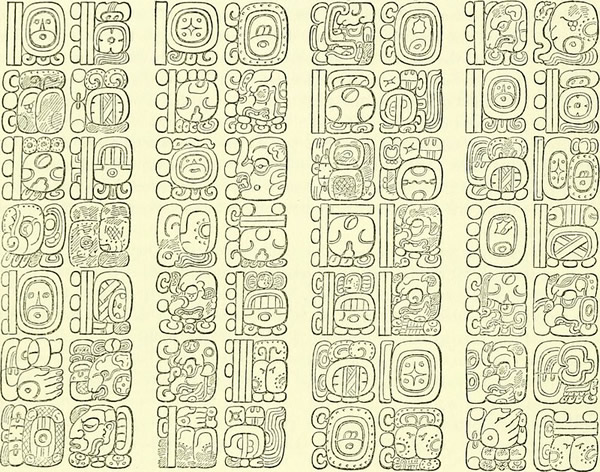
From: Flickr
Chinese, Japanese and Korean could be also be written in this way but aren’t, as far as I know. They could also be written in other directions as illustrated below.
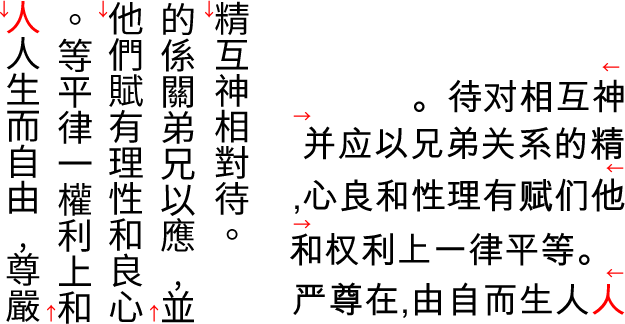
The text on the left starts on the top left and runs in vertical columns running from alternatively from top to bottom and bottom to top. The text on the right starts at the bottom right and runs in horizontal lines alternating from right to left and left to right.
If you’re thinking of created a writing system, one thing to consider is giving it a unique writing direction. This might inspire you.
Have a look at the English sentences below and see if anything stands out for you.
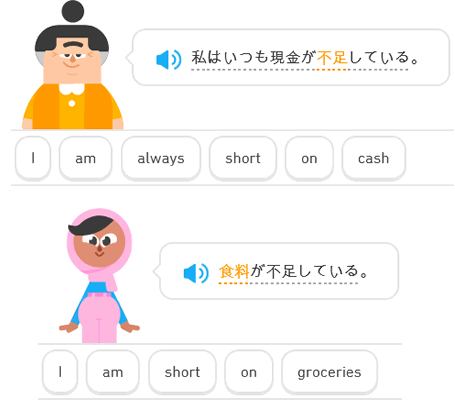
This comes from the Japanese course on Duolingo, by the way.
For me, the use of short on in these contexts seems odd. I would use short of here. When I saw this, I wondered if this is a difference between British English and American English – the English on Duolingo is generally American English.
I’ve noticed other subtle differences in the ways prepositions and other words like articles are used as well. For example, would you say I’m on the beach or I’m at the beach?
One Japanese way to say you’re short of/on something is 不足している (fusoku shite iru). 不足 (fusoku) on it’s own means insufficiency, deficiency, shortage, lack, scarcity, deficit, dissatisfaction, discontent or complaint. It appears in such expressions as:
不 (fu / bu) on it’s own means negative, non-, bad, ugly, clumsy, 足 (ashi) means foot, paw, arm, leg, gait or pace, and 足 (soku) it is used as a counter for pairs of footwear. The verb 足りる (tariru) means to be sufficient or enough, and 足る (taru) means to be sufficient or enough, to be worth doing, to deserve, serve or answer. If you don’t have quite enough of something, you could use the word 足らず (tarasu). It means just under, a little less than or just short of.
Source: jisho.org
There are some pairs of words that often go together, and usually in a particular order. For example, the title of this post, Pepper and Salt, might seem a bit strange to native English speakers, as we usually say salt and pepper. There are many ideas about why we do this, but it might just be an old habit that developed over time.
To Dutch speakers zout en peper (salt and pepper) would sound strange, as they usually say peper en zout (pepper and salt). Are there any other languages that do this?
The linguistic term for such pairs of words is binomials, and pairs of words that always, or almost always, appear in the same order are known as frozen binomials.
Some ideas about why these words are ordered in this way include:
Pairs of words that always go together in a particular order and have a collective meaning in addition to their individual meanings are known as irreversible binomials.
Examples include: rock and roll, and legal terms like law and order, (last) will and testament and:
Are there any language in which black and white is usually white and black, or other common pairs are reversed compared to English?
More about binomials
https://www.quickanddirtytips.com/education/grammar/frozen-binomials-why-do-we-cringe-at-pepper-and-salt
https://en.wikipedia.org/wiki/Irreversible_binomial
https://www.learngrammar.net/english-grammar/irreversible-binomials-definition-types-with-examples
https://en.wikipedia.org/wiki/Legal_doublet
Yesterday I added a page about the Moose Cree language to Omniglot. Moose Cree (ᐃᓕᓖᒧᐧᐃᓐ / ililîmowin) is a Central Algonquin language spoken mainly in the town of Moose Factory on Moose Factory Island on the Moose River in Ontario, Canada. That’s a lot of moose, or is it mooses, moosen or even meese? (see below)
A moose is:
“a ruminant mammal (Alces alces) with humped shoulders, long legs, and broadly palmated antlers that is the largest existing member of the deer family and inhabits forested areas of Canada, the northern U.S., Europe, and Asia” [source]
A moose can also be “a member of a major benevolent and fraternal order [Loyal Order of Moose]”.
The word moose was discussed in a previous post, along with the word elk and related words.
Today I thought I’d look into moose-related words in more detail.
Moose was first used in writing in English in 1603, and is thought to come from an Eastern Algonquian language such as Massachusett (moos), Narragansett (moos) or Penobscot (mos), from the Proto-Algonquian *môswa (it strips), referring to how a moose strips tree bark when feeding [source].
The standard plural of moose is moose, although mooses and meese are also used informally. I think a good alternative plural would be moosen, like oxen, children and aurochsen. What do you think?
In Moose Cree there are quite a few words moose-related words, including:
Source: The Dictionary of Moose Cree
There are also plenty of moose-related words in Plains Cree:
Source: Online Cree Dictionary
While there are pages about Massachusett (Wôpanâôtuwâôk) and Narragansett (Nãikanset) on Omniglot, there isn’t one about Penobscot (Pαnawάhpskewi), which is a variety of Eastern Abenaki that was spoken mainly in Maine in the USA until the 1990s, and which is currently being revived. I’ll be adding details soon.
There is an online Penobscot Dictionary which includes quite a few moose-related words.
Update: there is now a page about Penobscot on Omniglot.